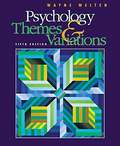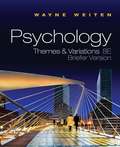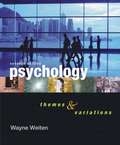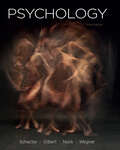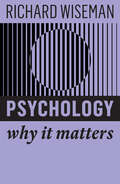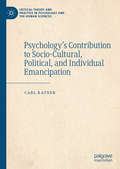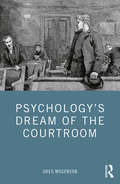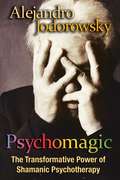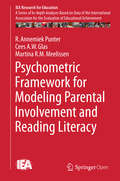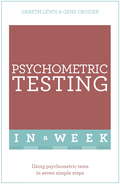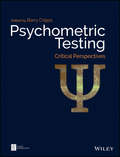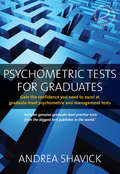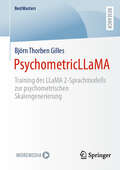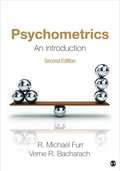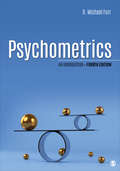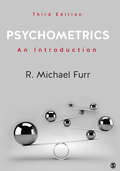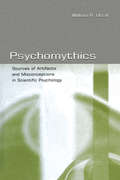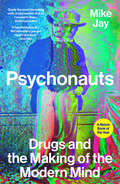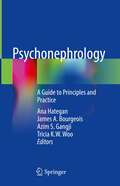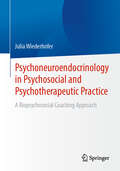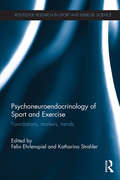- Table View
- List View
Psychology: Themes and Variations (5th Edition)
by Wayne WeitenFilled with exciting, current research findings, this affordable CENGAGE ADVANTAGE BOOKS version of PSYCHOLOGY: THEMES AND VARIATIONS shows you the many ways that psychology applies to your life today and every day! In the book's "Featured Studies," you'll get a bird's eye view of real psychological research in action. "Critical Thinking Applications" give you specific critical thinking tools that you can use to help you think analytically and critically about what you read. Weiten also helps you excel in the psychology course by including overarching concepts--weaving these concepts throughout the book to help you see how the topics and research you are studying fit together into one understandable picture called psychology! Every chapter offers tools to help you focus on what's important--showing you how to study in ways that help you retain information and do your very best on exams.
Psychology: Themes and Variations (8th Edition)
by Wayne WeitenIn PSYCHOLOGY: THEMES AND VARIATIONS, BRIEFER VERSION, Wayne Weiten continues his proven combination of a scientifically rigorous text with selective pedagogy that makes learning easy for students. Weiten's approach is backed by a straightforward writing style, unparalleled in-text visuals and didactic art program, and in-book review to help users prioritize and retain the core concepts. Weiten surveys psychology's broad range of content with three aims: to illuminate the process of research and its intrinsic relationship to application (themes); to show both the unity and diversity of the subject (variations), and to invite users to the study of psychology by respecting their ability to master its fundamental concepts. Weiten's themes (including empiricism, theoretical diversity, sociohistorical contexts, multifactorial causation, cultural heritage, heredity and environment, and subjectivity of experience) and variations provide unifying threads across chapters that help users see the connections among different research areas in psychology.
Psychology: Themes and Variations (Seventh Edition)
by Wayne WeitenThe Seventh Edition of Wayne Weiten's popular text, Psychology: Themes and Variations, continues to offer students a unique survey of psychology with three distinct goals: to show both the unity and diversity of psychology's subject matter; to illuminate the process of research and its intimate link to application, and to make the text challenging to think about and easy to learn from.
Psychology: Theory And Application
by Schacter Gilbert Nock WegnerThis bestselling textbook brings the latest developments in psychology to students in a signature writing style that will inspire a lifelong love of science. The authors--respected researchers and writers of popular press titles--invite students to join them on a tour of their favorite subject--psychological science. The new edition takes a closer look at the role psychology plays in our society, with new material in Chapter 2 that looks at the truth about psychological science, the rate of replication in published studies, and how critical thinking is foundational in science and life. Chapter 1 presents a new look at the history of the science with unexpected stories and new insights into its surprising origins. Each chapter has been fully updated with research and examples to portray a field that is constantly evolving and illuminating the world today. Combined with LaunchPad, including the LearningCurve adaptive quizzing system, the new Fifth Edition is a powerful way to introduce students to the science of psychology.
Psychology: Why It Matters (Why It Matters)
by Richard WisemanYou are remarkable: You experience a vast range of thoughts and feelings, including falling in love, remembering last Tuesday, and contemplating the meaning of life. And you can carry all sorts of astonishing behaviours, such as sauntering down the street, singing in falsetto and riding a unicycle. Psychologists study every aspect of how you think, feel, and behave. Richard Wiseman takes you on a personal journey into this fascinating world, focusing on what makes for meaningful research. He explores how psychology reveals the hidden workings of the mind, boosts critical thinking, debunks myths, improves lives, and informs debates in politics, philosophy, and education. This insider&’s guide lifts the lid on how psychologists go about their work, examines contemporary challenges associated with studying the mind, and encourages students and researchers to reflect on why they do what they do.If you&’ve ever wanted to think like a psychologist, spot a liar, uncover the truth about happiness, or discover how to create a more altruistic society, then this book is for you.
Psychology’s Contribution to Socio-Cultural, Political, and Individual Emancipation (Critical Theory and Practice in Psychology and the Human Sciences)
by Carl RatnerThis book articulates how psychologists can use their theory, research, and intervention to generate insights into emancipatory social change that is necessary to solve social and psychological problems. These include racism, sexism, civil rights, poverty, militarism, education, and politics. Psychology was not developed to directly address social issues. It must therefore be reconceptualised to fulfil this aim. In this book Carl Ratner makes use of Vygotsky’s psychological approach known as ‘cultural-historical psychology’, supplemented by Martin-Baro’s Liberation Psychology and the work of Bourdieu and Foucault to develop an emancipatory psychological theory. This approach is then utilized to lay out a specific program of social and psychological emancipation. This reconstructed psychological theory is also used to evaluate populist movements that aim at social and psychological emancipation. Ratner posits that populism is inadequate to solve social and psychological problems because it misunderstands the nature of society and what it takes to improve society and psychology. This is demonstrated through wide-ranging examples including populist feminism, populist socialism, and populist distortions of liberation psychology and cultural-historical psychology.This lively critique opens a pathway for academic across the social sciences concerned with how their disciplines can be oriented toward understanding and solving social-psychological problems, and will appeal to wide readership including policy makers, and social activists.
Psychology’s Dream of the Courtroom
by Greg MogensonWhat contribution has “the law” made to the work of analyst and patient in the consulting room? And what insights may be drawn from putting psychology itself on trial? In this ground-breaking book, the use of legal metaphors and the courtroom analogy by Freud, Jung, and psychology more generally are examined in relation to the practice of psychotherapy and analysis. In this way, psychoanalysis and analytical psychology are shown in fresh perspective to be disciplines of truth in the spirit of a trial or court proceeding.
Psychomagic: The Transformative Power of Shamanic Psychotherapy
by Alejandro JodorowskyA healing path using the power of dreams, theater, poetry, and shamanism • Shows how psychological realizations can cause true transformation when manifested by concrete poetic acts • Includes many examples of the surreal but successful actions Jodorowsky has prescribed to those seeking his help While living in Mexico, Alejandro Jodorowsky became familiar with the colorful and effective cures provided by folk healers. He realized that it is easier for the unconscious to understand the language of dreams than that of rationality. Illness can even be seen as a physical dream that reveals unresolved emotional and psychological problems. Psychomagic presents the shamanic and genealogical principles Jodorowsky discovered to create a healing therapy that could use the powers of dreams, art, and theater to empower individuals to heal wounds that in some cases had traveled through generations. The concrete and often surreal poetic actions Jodorowsky employs are part of an elaborate strategy intended to break apart the dysfunctional persona with whom the patient identifies in order to connect with a deeper self. That is when true transformation can manifest. For a young man who complained that he lived only in his head and was unable to grab hold of reality and advance toward the financial autonomy he desired, Jodorowsky gave the prescription to paste two gold coins to the soles of his shoes so that all day he would be walking on gold. A judge whose vanity was ruling his every move was given the task of dressing like a tramp and begging outside one of the fashionable restaurants he loved to frequent while pulling glass doll eyes out of his pockets. The lesson for him was that if a tramp can fill his pockets with eyeballs, then they must be of no value, and thus the eyes of others should have no bearing on who you are and what you do. Taking his patients directly at their words, Jodorowsky takes the same elements associated with a negative emotional charge and recasts them in an action that will make them positive and enable them to pay the psychological debts hindering their lives.
Psychometric Framework for Modeling Parental Involvement and Reading Literacy
by Annemiek Punter Cees A. W. Glas Martina R. M. MeelissenThis volume offers insights from modelling measures of parental involvement and their relationship with student reading literacy across countries, exploring and incorporating cultural differences. This is a significant contribution to a field where cross-cultural comparisons from a triangulated perspective are sparse. For readers interested in exploring the relationship between parental involvement and student attainment, the literature review provides a useful starting point. Meanwhile, for the more methodologically interested reader, this report presents state-of-the-art ways to identify and model cultural differential item functioning in international large-scale assessment (ILSA), illustrating the extent to which the parental involvement construct may be influenced by cultural differences and how this may affect the outcomes of cross-cultural comparisons. The framework is generic and should provide a solid foundation for future ILSA practices and secondary analyses. ILSA studies like the IEA's Progress in International Reading Literacy Study (PIRLS) provide valuable data, containing both student achievement data and contextual background data from schools, teachers, students and parents for over 41 countries.
Psychometric Testing In A Week: Using Psychometric Tests In Seven Simple Steps (Teach Yourself In A Week Ser.)
by Gareth Lewis Dr Gene CrozierPsychometric testing just got easierWe can measure how tall someone is, how strong they are or how fast they can run. But is it also possible to evaluate an individual's character traits, how they think and how they mightreact in a given situation? With psychometric tests, we can.Most people feel some trepidation at just the thought of taking a psychometric test. These tests can also be a source of anxiety for those who have never administered them before. If you are a project manager or an HR professional tasked with introducing psychometric tests to your organization and have no previous experience of using them, then reading this book is the first step you should take. Our aim is to overcome any fear of using tests by demystifying a subject that can, for the uninitiated, seem quite complex and daunting. This not a technical manual and so we have avoided unnecessary jargon and academic language. You certainly won't need a degree in mathematics or psychology to comprehend any of the contents. We will provide simple descriptions of psychometric tests, the benefits they offer, and the practical measures you will need to take to use them effectively. In just seven days, you will gain a basic understanding of psychometric tests that will serve as a sound foundation for whatever further learning you decide to pursue.Each of the seven chapters in Psychometric Testing In A Week covers a different aspect:- Sunday: The importance of psychometric testing- Monday: What are psychometric tests?- Tuesday: Tests of ability and aptitude- Wednesday: What is personality?- Thursday: Selecting psychometric tests- Friday: The uses of psychometric tests- Saturday: The organizational perspective
Psychometric Testing In A Week: Using Psychometric Tests In Seven Simple Steps (Teach Yourself In A Week Ser.)
by Gareth Lewis Gene CrozierThe ability to understand and perform well in psychometric tests is crucial to anyone who wants to advance their career.Written by Gareth Lewis and Gene Crozier, leading experts on psychometric testing, this book quickly teaches you the insider secrets you need to know to in order to make psychometric tests work for you.The highly motivational 'in a week' structure of the book provides seven straightforward chapters explaining the key points, and at the end there are optional questions to ensure you have taken it all in. There are also cartoons and diagrams throughout, to help make this book a more enjoyable and effective learning experience.So what are you waiting for? Let this book put you on the fast track to success!
Psychometric Testing: Critical Perspectives (BPS Textbooks in Psychology)
by Barry CrippsPsychometric Testing offers an in-depth examination of the strengths and limitations psychometric testing, with coverage of diverse methods of test development and application. A state-of-the-art exploration of the contemporary field of psychometric testing, bringing together the latest theory and evidence-based practice from 21 global experts Explores a variety of topics related to the field, including test construction, use and applications in human resources and training, assessment and verification of training courses, and consulting Includes applications for clinical psychology, performance psychology, and sport and exercise psychology across a range of professions (research, teaching, coaching, consulting, and advising) Acknowledges the dynamic nature of the field and identifies future directions in need of more research, including Internet and smart phone testing
Psychometric Tests for Graduates: Gain the confidence you need to excel at graduate-level psychometric and management tests
by Andrea ShavickAre you a graduate? Looking for a brilliant job? Then you should know that over 95 percent of the FTSE 100 companies use psychometric and management tests to select their graduate recruits, as do the police, the Civil Service, local authorities, the Armed Forces, the Fire Service, financial institutions, the motor industry, the IT industry - the list is endless. In fact, tests are now an integral part of the recruitment process for most medium-large sized organisations worldwide. So if you're looking for a job, you need this book! It includes: 37 genuine graduate-level practice tests from SHL Group plc, the biggest test publisher in the world; 227 questions covering verbal, numerical, abstract and spatial reasoning, mechanical comprehension, fault diagnosis, accuracy and personality; and, genuine practice Brainstorm, Scenarios and Fastrack management tests. It also includes valuable advice on: online psychometric tests; researching your target employer; and, assessment centre visits (including role-plays, group discussions, in-tray exercises and presentations). This book gives you the three things you need to pass graduate-level psychometric and management tests: information, confidence, and plenty of practice.
PsychometricLLaMA: Training des LLaMA 2-Sprachmodells zur psychometrischen Skalengenerierung (BestMasters)
by Björn Thorben GillesDie rasante Entwicklung generativer Sprachmodelle eröffnet neue Möglichkeiten der psychologischen Skalenentwicklung. Diese prä-registrierte Arbeit untersucht den Einsatz von Sprachmodellen zur automatischen Generierung von Likert-Items, aufbauend auf bisherigen Ansätzen. Ein neuer Datensatz wurde durch eine systematische Literaturrecherche erstellt und mit bestehenden Quellen kombiniert, um das LLaMA 2-Sprachmodell mittels Low-Rank Adaption zu trainieren. Das Modell generiert auf Basis einer Definition psychologische Items mit Anpassungsmöglichkeiten für Schwierigkeit und Kreativität. Zur Überprüfung der psychometrischen Güte wurden Items zu sechs Konstrukten generiert und online mit N = 200 Personen erhoben. Die Ergebnisse zeigten vielversprechende psychometrische Kennwerte: Die meisten Items konnten eine gute interne Konsistenz und hohe Korrelationen mit den Originalskalen aufweisen. Allerdings war die Anpassung der Item-Schwierigkeit nicht erfolgreich. Unterschiede in Antwortverteilung und Interkorrelationen zwischen KI- und Originalskalen wurden festgestellt. Insgesamt leistet diese Arbeit einen bedeutenden Beitrag zur psychologischen Fragebogenkonstruktion durch das Fine-Tuning eines KI-Modells zur Generierung reliabler und valider Items.
Psychometrics: An Introduction
by R. Michael Furr Dr Verne R. BacharachFrom a perspective that focuses on the meaning, purpose, and implications of key psychometric concepts, principles, and procedures, Psychometrics: An Introduction, Second Edition (by R. Michael Furr and Verne R. Bacharach) introduces the subject and study of psychometrics. It addresses these topics at a level that is deeper and more focused than what is found in typical introductory undergraduate testing and measurement texts, but is much more intuitive than what is traditionally found in the more technical publications intended for advanced graduate courses. By emphasizing concepts over mathematical proofs and by focusing on practical significance, this book assists students in appreciating not just how measurement problems can be addressed, but why it is crucial to address them.
Psychometrics: An Introduction
by Richard Michael FurrIn this fully revised Fourth Edition of Psychometrics: An Introduction, author R. Michael Furr centers his presentation around a conceptual understanding of psychometric core issues, such as scales, reliability, and validity. Focusing on purpose rather than procedure and the "why" rather than the "how to," this accessible book uses a wide variety of examples from behavioral science research so readers can see the importance of psychometric fundamentals in research. By emphasizing concepts, logic, and practical applications over mathematical proofs, this book gives students an appreciation of how measurement problems can be addressed and why it is important to address them. The book offers readers the most contemporary views of topics in psychometrics available in the nontechnical psychometric literature.
Psychometrics: An Introduction
by Richard Michael FurrIn this fully revised Fourth Edition of Psychometrics: An Introduction, author R. Michael Furr centers his presentation around a conceptual understanding of psychometric core issues, such as scales, reliability, and validity. Focusing on purpose rather than procedure and the "why" rather than the "how to," this accessible book uses a wide variety of examples from behavioral science research so readers can see the importance of psychometric fundamentals in research. By emphasizing concepts, logic, and practical applications over mathematical proofs, this book gives students an appreciation of how measurement problems can be addressed and why it is important to address them. The book offers readers the most contemporary views of topics in psychometrics available in the nontechnical psychometric literature.
Psychometrics: An Introduction (Sage Library In Social And Personality Psychology Methods Ser.)
by R. Michael FurrUsing a meaning-based approach that emphasizes the “why” over the “how to,” Psychometrics: An Introduction provides thorough coverage of fundamental issues in psychological measurement. Author R. Michael Furr discusses traditional psychometric perspectives and issues including reliability, validity, dimensionality, test bias, and response bias as well as advanced procedures and perspectives including item response theory and generalizability theory. The substantially updated Third Edition includes broader and more in-depth coverage with new references, a glossary summarizing over 200 key terms, and expanded suggested readings consisting of highly relevant papers to enhance the book’s overall accessibility, scope, and usability.
Psychometrics: An Introduction (Sage Library In Social And Personality Psychology Methods Ser.)
by R. Michael FurrUsing a meaning-based approach that emphasizes the “why” over the “how to,” Psychometrics: An Introduction provides thorough coverage of fundamental issues in psychological measurement. Author R. Michael Furr discusses traditional psychometric perspectives and issues including reliability, validity, dimensionality, test bias, and response bias as well as advanced procedures and perspectives including item response theory and generalizability theory. The substantially updated Third Edition includes broader and more in-depth coverage with new references, a glossary summarizing over 200 key terms, and expanded suggested readings consisting of highly relevant papers to enhance the book’s overall accessibility, scope, and usability.
Psychomythics: Sources of Artifacts and Misconceptions in Scientific Psychology
by William R. UttalPsychology deals with the most complex subject matter of any science. As such, it is subject to misunderstandings, artifacts, and just simple errors of data, logic, and interpretation. This book teases out the details of some of the sources of these errors. It considers errors in psychological data and theories that arise from confusing endogenous and exogenous causal forces in perceptual research, misinterpreting the effects of inevitable natural laws as psychological phenomena, improper application of statistics and measurement, and flawed assumptions. Examples of each of these sources of error are presented and discussed. Finally, the book concludes that a return to a revitalized kind of behaviorism is preferred, rather than continuing on the current cognitive path.
Psychonauts: Drugs and the Making of the Modern Mind
by Mike JayA provocative and original history of the scientists and writers, artists and philosophers who took drugs to explore the hidden regions of the mind A New Yorker Best of the Week Pick “Jay is a leading expert on the history of Western drug use, and Psychonauts is the latest in a series of excellent studies in which he has investigated the roots of a kind of psychoactive exploration that we tend to associate with the nineteen-fifties and sixties.”—Clare Bucknell, New Yorker “Captivating. . . . A welcome reconsideration of the role drugs play in life, medicine, and science.”—Publishers Weekly Until the twentieth century, scientists investigating the effects of drugs on the mind did so by experimenting on themselves. Vivid descriptions of drug experiences sparked insights across the mind sciences, pharmacology, medicine, and philosophy. Accounts in journals and literary fiction inspired a fascinated public to make their own experiments—in scientific demonstrations, on exotic travels, at literary salons, and in occult rituals. But after 1900 drugs were increasingly viewed as a social problem, and the long tradition of self-experimentation began to disappear. From Sigmund Freud’s experiments with cocaine to William James’s epiphany on nitrous oxide, Mike Jay brilliantly recovers a lost intellectual tradition of drug-taking that fed the birth of psychology, the discovery of the unconscious, and the emergence of modernism. Today, as we embrace novel cognitive enhancers and psychedelics, the experiments of the original psychonauts reveal the deep influence of mind-altering drugs on Western science, philosophy, and culture.
Psychonephrology: A Guide to Principles and Practice
by James A. Bourgeois Ana Hategan Azim S. Gangji Tricia K. W. WooThe book focuses on pharmacological and non-pharmacological approaches of psychiatric syndromes that commonly occur in patients with kidney disease. It specifically reviews principles of psychotherapy and psychopharmacology with an emphasis on organ impairment and drug-drug interactions specific to nephrology. This book also covers issues with medication nonadherence in patients with chronic kidney disease and psychiatric comorbidity, as well as the associated issues in dialysis and renal transplantation. Additionally, chapters cover various other topics addressing an active stance towards health promotion in chronically ill patients, including the critical role of the diet and physical activity. Such advice is often complex and changing depending on the stage of chronic kidney disease and the individual needs of the patient. Written by specialists in the field, Psychonephrology: A Guide to Principles and Practice serves as a valuable reference and teaching tool that provides an opportunity for learning across a rapidly evolving medical field.
Psychoneuroendocrinology in Psychosocial and Psychotherapeutic Practice: A Biopsychosocial Coaching Approach
by Julia WiederhoferWhat are hormones, and what significance do they have for the psyche and our behavior? Do hormones influence our psyche and behavior? Can our behavior influence our hormones? Is there a connection between hormones and mental disorders? This book explores the interplay between the neurobiological foundations of psychological experiences and behavior, endocrine processes, and psychosocial environmental influences. It presents the foundational research of both the scientific disciplines of endocrinology and psychoneuroendocrinology in a way that is accessible to readers without medical or neurobiological backgrounds. This book demonstrates for the first time how these interdisciplinary insights can be implemented into a biopsychosocial coaching approach, which serves both to maintain and promote mental health. It is a coaching approach suitable for both psychosocial counseling and psychotherapeutic practice.
Psychoneuroendocrinology of Sport and Exercise: Foundations, Markers, Trends (Routledge Research in Sport and Exercise Science)
by Felix Ehrlenspiel Katharina StrahlerPsychoneuroendocrinology is the study of the interaction between hormones, the brain and human behaviour. This is the first book to examine psychoneuroendocrinology in the context of sport and exercise, offering a comprehensive review of current research and assessment techniques and highlighting directions for future research. The book explores the links between hormones and behaviour, and draws important conclusions for how their study will aid in the understanding of the bidirectional link between sport and behaviour, central to the psychology of sport and exercise. It presents the key hormones that underpin behaviour in a sporting context, including the description of their physiologic mechanisms and behavioural effects. The book reports benchmark standards for the assessment and analysis of hormonal influences of behaviour in sport, and examines practical issues and contexts such as emotional state, overtraining and stress. Psychoneuroendocrinology in Sport and Exercise is a breakthrough text that will be of interest to all advanced students and researchers working in the psychology and physiology of sport and exercise.
Psychoneuroendokrinologie in der psychosozialen und psychotherapeutischen Praxis: Ein biopsychosozialer Coachingansatz
by Julia WiederhoferWas sind Hormone und welche Bedeutung haben sie für die Psyche bzw. unser Verhalten? Beeinflussen Hormone unsere Psyche bzw. unser Verhalten? Kann unser Verhalten unsere Hormone beeinflussen? Besteht ein Zusammenhang zwischen Hormonen und psychischen Störungen? In diesem Buch wird das Wechselspiel zwischen neurobiologischen Grundlagen psychischen Erlebens und Verhaltens, den endokrinen Vorgängen sowie psychosozialen Umwelteinflüssen gezeigt. Dabei wird die Grundlagenforschung, sowohl der wissenschaftlichen Disziplin Endokrinologie als auch der Psychoneuroendokrinologie dargestellt und so erläutert, dass auch Leserinnen ohne medizinische oder neurobiologische Vorkenntnisse diese komplexen Wissenschaften verstehen. Dieses Buch zeigt zum ersten Mal, wie diese interdisziplinären Erkenntnisse in einen biopsychosozialen Coachingansatz implementiert werden können, der sowohl zur Aufrechterhaltung als auch zur Förderung der psychischen Gesundheit dient. Ein Coachingansatz, der für die psychosoziale und für die psychotherapeutische Praxis geeignet ist.
